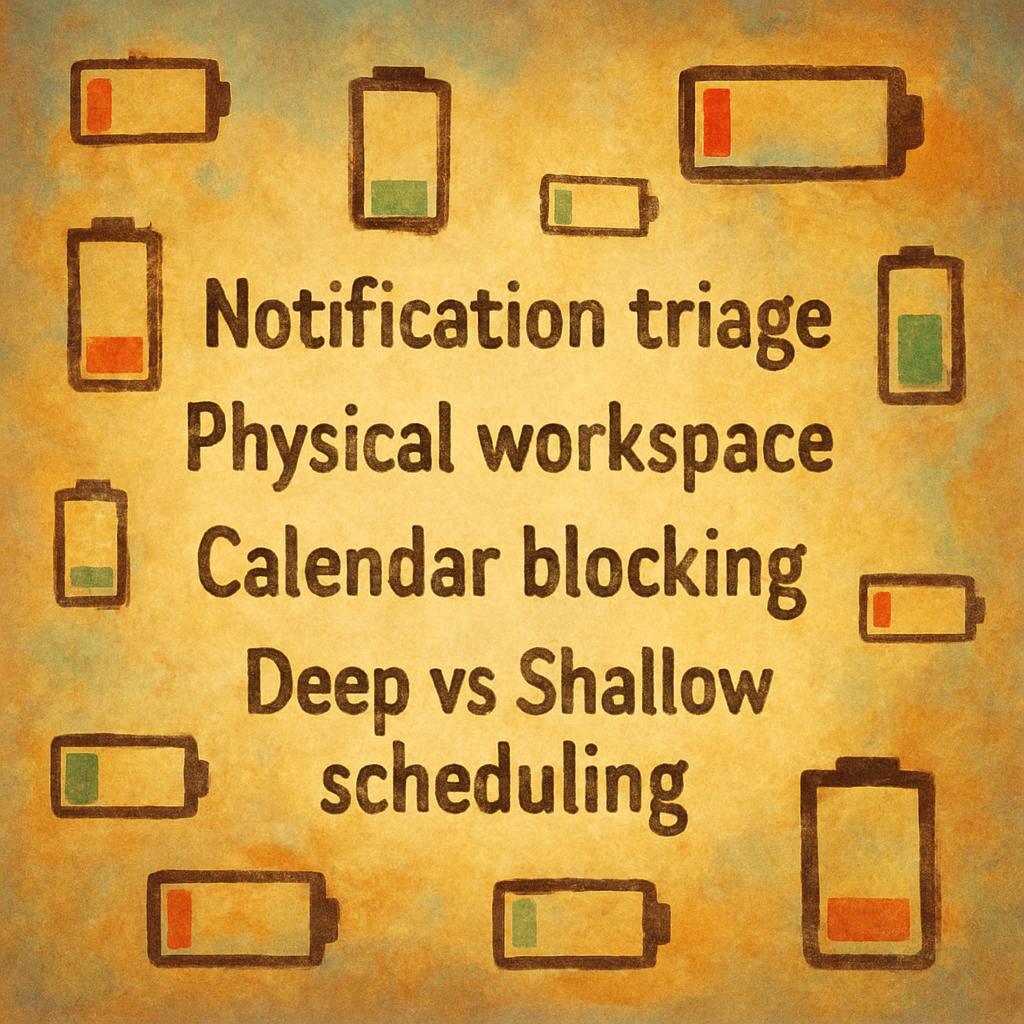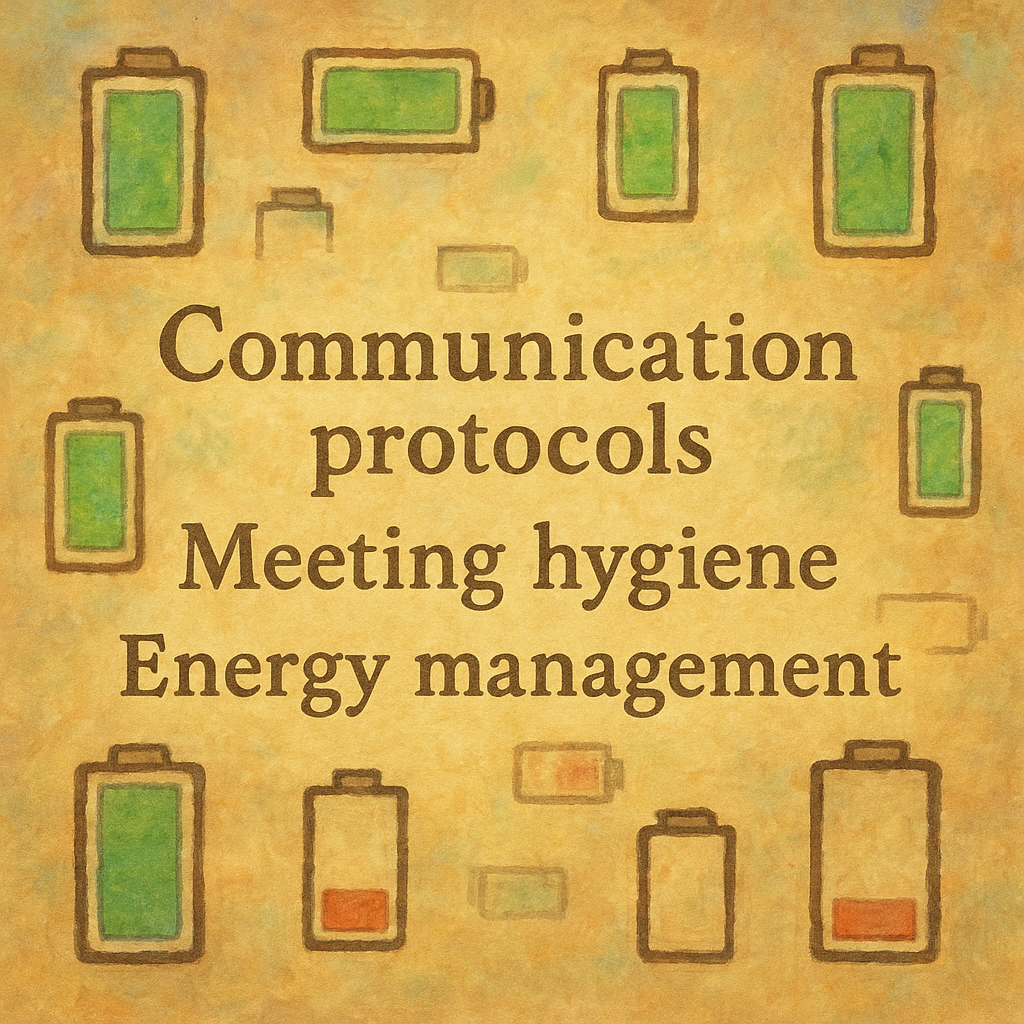Low Battery - Quick Reference Guide
Posted on:
source
Your cognitive battery is your most valuable resource. Here are immediate actions and long-term strategies to help preserve and manage your mental energy throughout the day.
The Problem
Most professionals spend only 20-40% of their time on meaningful work. The rest is lost to task switching, managing interruptions, and cognitive overhead. Every time you switch between tasks, your brain pays a cognitive tax - like closing one app and opening another, it creates processing overhead and errors.

4 Quick Fixes (Start Today)
1. Notification Triage
Problem: Every notification is a context switch that drains cognitive battery, even if you don't check it immediately.
Action:
- Turn off non-essential notifications on phone and computer
- Email and Slack don't need real-time responses
- Batch check messages at dedicated times (e.g., 9am, 1pm, 4pm)
- Use "Do Not Disturb" modes liberally
2. Physical Workspace
Problem: Your environment constantly demands cognitive resources to filter out distractions.
Action:
- In office: Position yourself to minimize peripheral movement, use headphones to signal "don't interrupt"
- At home: Dedicate a specific space for work so your brain associates it with focus mode
- Clear visual distractions from your workspace
3. Calendar Blocking
Problem: Most people are calendar reactive - letting meetings fill their day and trying to do real work in the gaps.
Action:
- Block time for your most important work FIRST
- Let meetings fill around your deep work blocks
- Aim for 2-hour blocks (long enough for flow state, short enough to maintain energy)
- Protect your calendar like you'd protect your most valuable resource
4. Deep vs Shallow Scheduling
Problem: Trying to do high-cognitive work when your battery is already drained.
Action:
- Schedule your most important thinking work when your battery is full (usually mornings)
- Save low-cognitive tasks (email, admin work) for when you're running on fumes
- Match task difficulty to your current energy level

3 Long-Term Strategies
1. Communication Protocols
Goal: Reduce unnecessary cognitive interruptions across your team.
Implementation:
- Establish clear communication norms with your team and stakeholders
- Define what constitutes "urgent" vs "can wait"
- Create protocols for when it's okay to interrupt deep work
- Most "urgent" things aren't actually urgent - question the default
2. Meeting Hygiene
Goal: Minimize the cognitive drain from poorly managed meetings.
Implementation:
- Build transition time between meetings for proper context switching
- Protect meeting-free blocks for your team's deep work
- Always have an agenda - aimless meetings are cognitive torture
- Consider if this meeting could be an async message instead
3. Energy Management
Goal: Become conscious of your cognitive patterns and plan accordingly.
Implementation:
- Track when you're sharpest vs when you crash
- Plan demanding work during your peak hours
- Schedule recovery time after big presentations or intense work
- Know your limits and respect them
Implementation Checklist
Tomorrow:
- [ ] Choose ONE quick fix to implement
- [ ] Turn off 3 non-essential notifications
- [ ] Block 2 hours of calendar time for deep work
This Week:
- [ ] Audit your workspace for distractions
- [ ] Establish one communication protocol with your team
- [ ] Track your energy levels throughout the day
This Month:
- [ ] Implement all 4 quick fixes
- [ ] Establish meeting hygiene practices
- [ ] Create a sustainable energy management system

Remember
- Don't try to implement everything at once - pick one thing and make it a habit first
- Small changes compound - consistency beats intensity
- Your cognitive battery is precious - protect it like you would any valuable resource
- You wouldn't expect your phone to last days without charging - don't expect the same from your brain
Based on the "Low Battery" talk by Callum Silcock. View the full presentation for detailed context and examples.